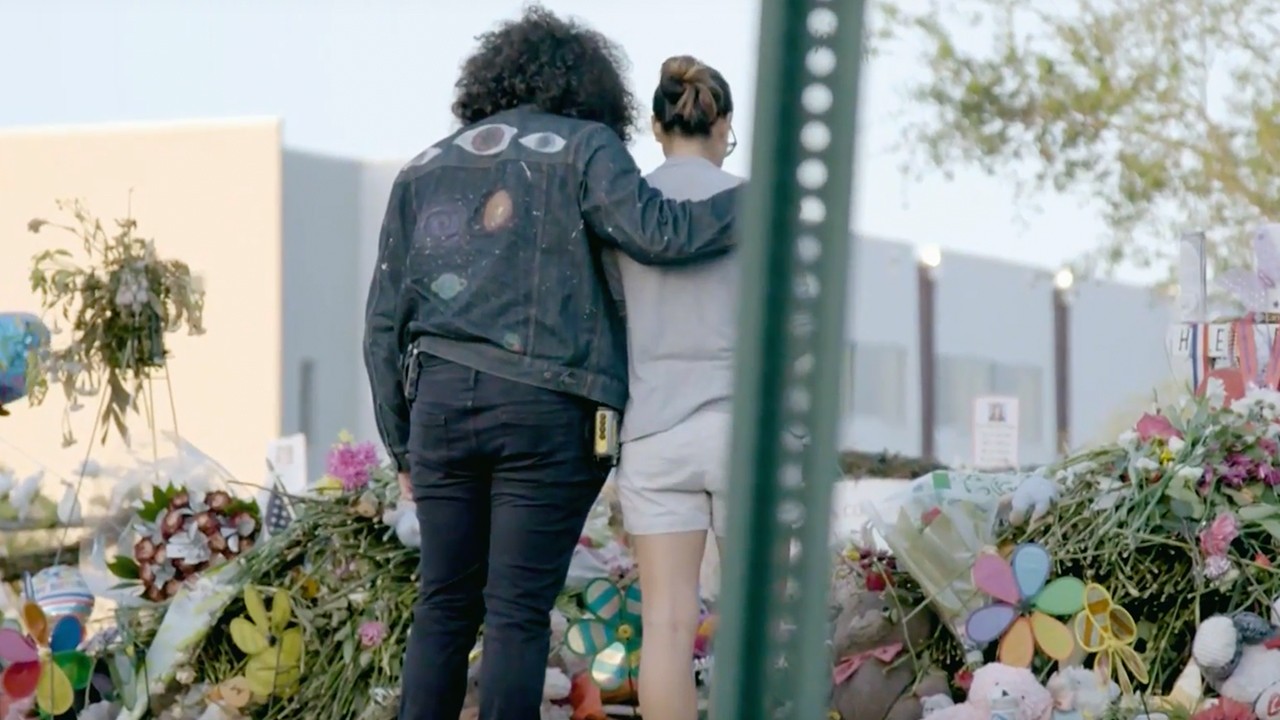Image courtesy of Netflix.
The following contains spoilers from season two of 13 Reasons Why.When it debuted last year, Netflix’s 13 Reasons Why triggered a polarizing conversation about mental health, rape culture, and the hazy limitations of what stories should (or shouldn’t) be televised. The show was critiqued for its dispassionate handling of teen suicide; as a corrective, a content warning airs before each episode of its latest instalment. Still, the second season regressed into yet another dangerous narrative—one where the tragic school shooter, an inevitable byproduct of the cruelty of his peers, can be avoided with simple rudimentary compassion.In the final moments of the season finale, Clay Jensen (Dylan Minette) and Tyler Down (Devin Druid) stand in their high school parking lot, bathed in the ultraviolet glow of the school dance taking place just inside. Tyler, worn by years of increasingly violent torment, carries a semiautomatic rifle; Clay, method acting as a crisis negotiator, begs him to reconsider. “Tyler…listen…you don’t get out of this alive,” he says. “And I don’t want you to die.” That there’s an eerie familiarity to the scene isn’t just dark happenstance. The date is April 20—the anniversary of the Columbine school shooting—and Tyler is a caricature of everything we’ve heard about from mass shooting coverage over the last couple news cycles: male, white, an outcast, struggling with mental health, nursing an obliterated ego. “There’s nothing else I can do,” he says earnestly.Ultimately, love saves the day. Clay takes the gun. Tyler climbs into the back of a friend’s car and escapes the police. The Alarm’s alt-rock song, “Strength,” soundtracks the moment: “Give me love/Give me strength/Give me hope/Give me someone to live for.” The curtains close; the show is over. The credits roll; I roll my eyes.While he fails to consummate the school shooter ID the series had previously been grooming him toward, our compassion at once shifts to Tyler Down, who accepted love and was absolved of hate. And therein lies the central thesis of Netflix’s soapy high school drama, bewilderingly childlike, like a playground initiative: “Just be kind,” it seems to offer, “and school shootings won’t happen.”In February, in Parkland, Florida, a nineteen-year-old carried an AR-15 assault weapon he purchased legally into his old high school and opened fire, killing 17 people. Pockets of alt-right social media exploded with the nuclear idea that the school’s students had bullied the shooter and were therefore responsible for the massacre (despite little evidence in support of such an indictment). At a press conference, President Donald Trump, uninspired, affected solicitude: “I want to speak now directly to America’s children, especially those who feel lost, alone, confused or even scared…Answer hate with love; answer cruelty with kindness.”In this way, the 13 Reasons Why plot devolves into a morality tale, turning on the axis of this same reductive declaration. More importantly, at a critical time where gun control reform has real estate at the front of the public imagination, the show fails to make a case for it. Policy is unnecessary. Love is the antidote.“No amount of kindness or compassion would have changed the person that Nikolas Cruz is and was, or the horrendous actions he perpetrated,” Parkland student Isabelle Robinson wrote in a Times op-ed. “That is a weak excuse for the failures of our school system, our government and our gun laws.”Deploying the epidemic of gun violence in a YA series as a lazy plot line to generate viewership feels especially gruesome in today’s cultural moment, when there has been a school shooting every week, and when the season première shared a day with the tragic Santa Fe massacre.Perhaps over ambitiously, 13 Reasons Why tackles an expansive arsenal of issues: bullying, sexual assault, homophobia, drunk driving, slut shaming—as well as the consequences if one chooses to be a bystander to all these things. It does this under the guise of anti-censorship and a refusal to “sugarcoat” the truth, but fails to do so responsibly or realistically.
That there’s an eerie familiarity to the scene isn’t just dark happenstance. The date is April 20—the anniversary of the Columbine school shooting—and Tyler is a caricature of everything we’ve heard about from mass shooting coverage over the last couple news cycles: male, white, an outcast, struggling with mental health, nursing an obliterated ego. “There’s nothing else I can do,” he says earnestly.Ultimately, love saves the day. Clay takes the gun. Tyler climbs into the back of a friend’s car and escapes the police. The Alarm’s alt-rock song, “Strength,” soundtracks the moment: “Give me love/Give me strength/Give me hope/Give me someone to live for.” The curtains close; the show is over. The credits roll; I roll my eyes.While he fails to consummate the school shooter ID the series had previously been grooming him toward, our compassion at once shifts to Tyler Down, who accepted love and was absolved of hate. And therein lies the central thesis of Netflix’s soapy high school drama, bewilderingly childlike, like a playground initiative: “Just be kind,” it seems to offer, “and school shootings won’t happen.”In February, in Parkland, Florida, a nineteen-year-old carried an AR-15 assault weapon he purchased legally into his old high school and opened fire, killing 17 people. Pockets of alt-right social media exploded with the nuclear idea that the school’s students had bullied the shooter and were therefore responsible for the massacre (despite little evidence in support of such an indictment). At a press conference, President Donald Trump, uninspired, affected solicitude: “I want to speak now directly to America’s children, especially those who feel lost, alone, confused or even scared…Answer hate with love; answer cruelty with kindness.”In this way, the 13 Reasons Why plot devolves into a morality tale, turning on the axis of this same reductive declaration. More importantly, at a critical time where gun control reform has real estate at the front of the public imagination, the show fails to make a case for it. Policy is unnecessary. Love is the antidote.“No amount of kindness or compassion would have changed the person that Nikolas Cruz is and was, or the horrendous actions he perpetrated,” Parkland student Isabelle Robinson wrote in a Times op-ed. “That is a weak excuse for the failures of our school system, our government and our gun laws.”Deploying the epidemic of gun violence in a YA series as a lazy plot line to generate viewership feels especially gruesome in today’s cultural moment, when there has been a school shooting every week, and when the season première shared a day with the tragic Santa Fe massacre.Perhaps over ambitiously, 13 Reasons Why tackles an expansive arsenal of issues: bullying, sexual assault, homophobia, drunk driving, slut shaming—as well as the consequences if one chooses to be a bystander to all these things. It does this under the guise of anti-censorship and a refusal to “sugarcoat” the truth, but fails to do so responsibly or realistically.
Advertisement

Advertisement
Advertisement
At its best, in fleeting moments, 13RW transforms into a spectacle of idealism: when a student publicly reveals she’s a lesbian, her two fathers decide on a movie night and fight over which LGBT flick to show her (“The male gaze makes Blue is the Warmest Color very suspect as fodder for positive conversation.”) It effectively illustrates the realities of white male privilege: the jock who raped Hannah Baker—and a number of other girls—is reprimanded with a slap on the wrist and accepts a generous three-month probation.But at its worst, the masturbatory show, as writer Laura Zak articulated, becomes “trauma porn parading as woke media,” constrained by the exigencies of shock value.By the end of the operatic series, I had stuttered across the familiar stages of Tiffany Pollard GIFdom, with my overarching mood finally settling as this one: a visibly irritated Pollard, consumed by fatigue and distaste, massaging vexation from her temples as a portrait of emotional universality.Follow Connor on Twitter.Sign up for the VICE Canada Newsletter to get the best of VICE Canada delivered to your inbox daily.
